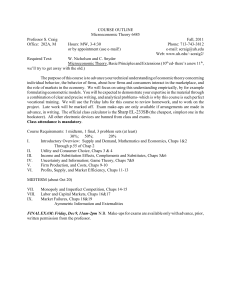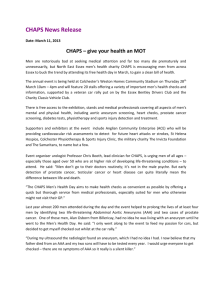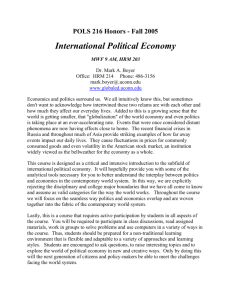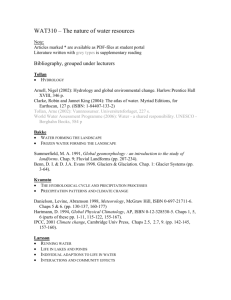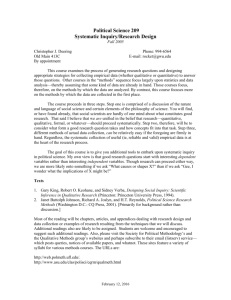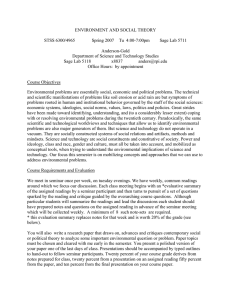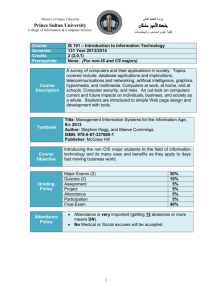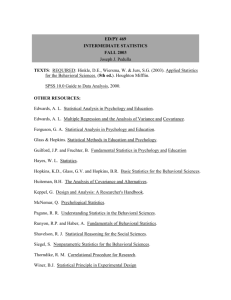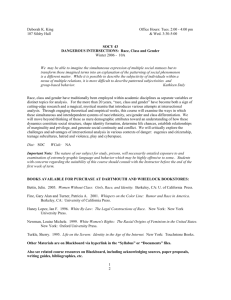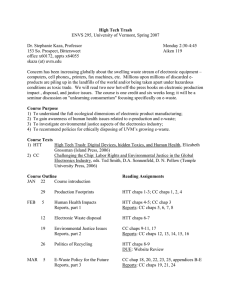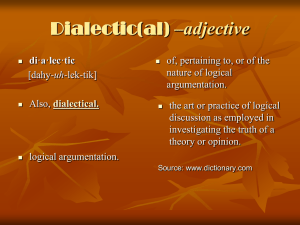Proseminar in International Politics Syllabus for Political Science 504
advertisement
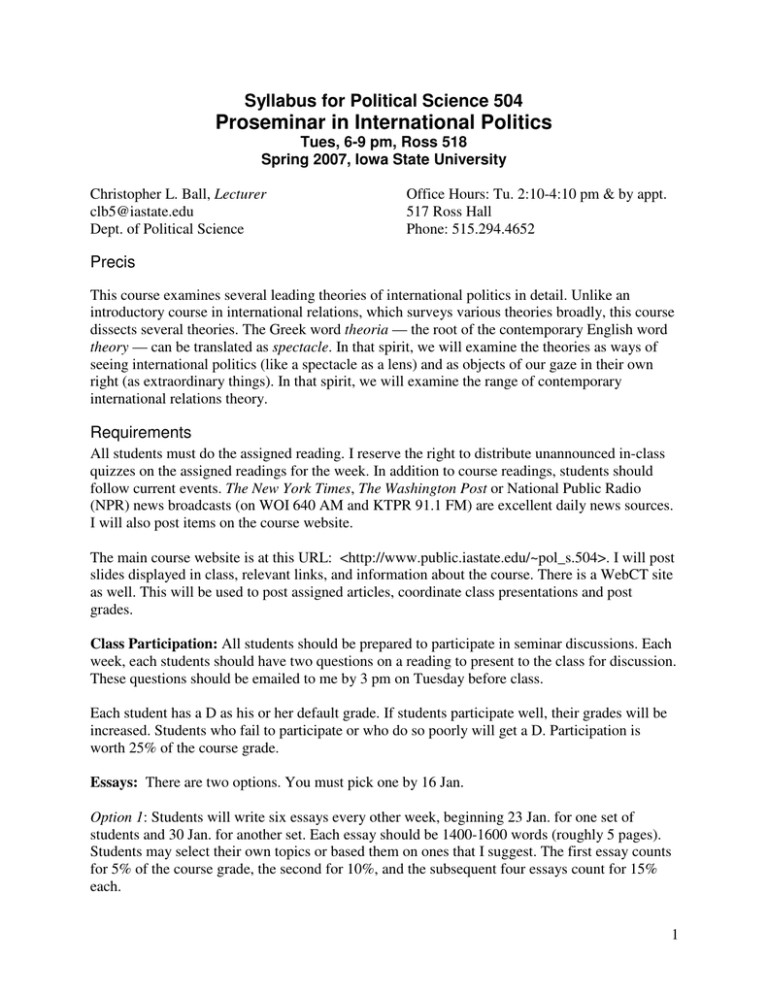
Syllabus for Political Science 504 Proseminar in International Politics Tues, 6-9 pm, Ross 518 Spring 2007, Iowa State University Christopher L. Ball, Lecturer clb5@iastate.edu Dept. of Political Science Office Hours: Tu. 2:10-4:10 pm & by appt. 517 Ross Hall Phone: 515.294.4652 Precis This course examines several leading theories of international politics in detail. Unlike an introductory course in international relations, which surveys various theories broadly, this course dissects several theories. The Greek word theoria — the root of the contemporary English word theory — can be translated as spectacle. In that spirit, we will examine the theories as ways of seeing international politics (like a spectacle as a lens) and as objects of our gaze in their own right (as extraordinary things). In that spirit, we will examine the range of contemporary international relations theory. Requirements All students must do the assigned reading. I reserve the right to distribute unannounced in-class quizzes on the assigned readings for the week. In addition to course readings, students should follow current events. The New York Times, The Washington Post or National Public Radio (NPR) news broadcasts (on WOI 640 AM and KTPR 91.1 FM) are excellent daily news sources. I will also post items on the course website. The main course website is at this URL: <http://www.public.iastate.edu/~pol_s.504>. I will post slides displayed in class, relevant links, and information about the course. There is a WebCT site as well. This will be used to post assigned articles, coordinate class presentations and post grades. Class Participation: All students should be prepared to participate in seminar discussions. Each week, each students should have two questions on a reading to present to the class for discussion. These questions should be emailed to me by 3 pm on Tuesday before class. Each student has a D as his or her default grade. If students participate well, their grades will be increased. Students who fail to participate or who do so poorly will get a D. Participation is worth 25% of the course grade. Essays: There are two options. You must pick one by 16 Jan. Option 1: Students will write six essays every other week, beginning 23 Jan. for one set of students and 30 Jan. for another set. Each essay should be 1400-1600 words (roughly 5 pages). Students may select their own topics or based them on ones that I suggest. The first essay counts for 5% of the course grade, the second for 10%, and the subsequent four essays count for 15% each. 1 Option II: Students will write three essays during the term at a schedule that I set and a more comprehensive research paper due during finals. Each term essay will be 1100-1300 words (roughly 4 pages). The first essay will count for 5% of the course grade, the subsequent two for 10% each. The research paper will be 6,000-7,000 words long (20-25 pages), and will count for 50% of the grade. Penalties: Students must submit assignments on time. There are two exceptions. First, for personal emergencies (e.g., a death in the family, medical problems), students should obtain a note from the dean of students or their physician. Second, for students with extra-curricular activities that conflict with deadlines, arrangements for an alternate date and time must be made at least a week in advance. The student must provide verification of the activity in order to be eligible for an alternate deadline. I do not accept notification after the fact (e.g., “I didn’t turn in my paper last week because I had a match/concert”). A computer mishap will not excuse a late paper. You should make frequent and multiple backups of your work (to at least 2 separate floppy disks or other removable media), so that you never lose more than one hour’s worth of work. If you own your own computer, be sure you familiarize yourself with the ISU’s computer labs in case your system breaks down. Grade Components Your final grade will be calculated as follows: • Participation: 25% • Essays: 75% Each component will be assigned a letter grade, converted to a grade point, and multiplied by its percentage weighting. I do not accept make-up assignments, re-writing of papers, or extra-credit work. Academic Honesty Iowa State University regulations regarding academic honesty will be enforced. See Iowa State University Catalog, “Academic Dishonesty,” p.38-39. The penalty for plagiarism or cheating on exams is failure for the course. ISU advises: “If a student has a disability that qualifies under the Americans with Disabilities Act and Section 504 of the Rehabilitation Act and requires accommodations, he/she should contact the Disability Resources (DR) office for information on appropriate policies and procedures. DR is located on the main floor of the Student Services Building, Room 1076; their phone is 515-294-6624.” Readings There are seven books available for purchase at the University Bookstore and on reserve at Parks Library. Other articles will be posted to the WebCT page.. Buzan, Barry. From International to World Society?: English School Theory and the Social Structure of Globalisation. New York: Cambridge University Press, 2004. 2 Deudney, Daniel. Bounding Power: Republican Security Theory from the Polis to the Global Village. Princeton, N.J: Princeton University Press, 2006. Doyle, Michael W. Ways of War and Peace: Realism, Liberalism, and Socialism. 1st ed, New York: Norton, 1997. Hasenclever, Andreas. Theories of International Regimes. New York: Cambridge University Press, 1997. Keohane, Robert O., ed. Neorealism and Its Critics. New York: Columbia University Press, 1986. Van Evera, Stephen. Causes of War: Power and the Roots of Conflict. Ithaca: Cornell University Press, 1999. Wendt, Alexander. Social Theory of International Politics. New York: Cambridge University Press, 1999. ______________________________________________________________________________ 9 Jan. Introduction Gabriel A. Almond; Stephen J. Genco, “Clouds, Clocks, and the Study of Politics”World Politics 29: 4. (July 1977), pp. 489-522. WebCT Alexander L George, “Knowledge for Statecraft,” International Security 22:1 (Summer 1997), pp.44-52 WebCT 16 Jan. Classical Realism Doyle, introduction to part I and chaps. 1-3 TBA (excerpts from classical readings) 23 Jan. Classical Liberalism Doyle, Part II (all) TBA (excerpts from classical readings) 30 Jan. Neo-Realism… Keohane, chaps. 1-5 6 Feb. …and its Critics… Keohane, chaps. 6-7 & 10-11 3 13 Feb. … and its Radical Critics Doyle, Part III (all) Keohane, chaps. 8-9 20 Feb. Theories of International Regimes Hasenclever, et al., chaps. 1-4 27 Feb. The Constructivist Challenge I Wendt, chaps. 1-4 6 Mar. The Constructivist Challenge II Wendt, chaps. 5-7 Hasenclever, chap. 5 Spring Break 20 Mar. Criticizing Constructivism TBA 27 Mar. Society, Systems, and the “English School” Buzan, chaps.1-2, 4-6 & 8 3 Apr. Causes of Wars I Van Evera, chaps. 1-5 10 Apr. Causes of Wars II Van Evera, chaps. 6-9 17 Apr. Republican Security Theory Deudney, all 24 Apr. Conclusions 4
